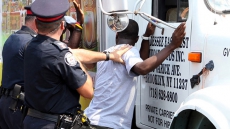VANCOUVER — Yannick Craigwell doesn't need to guess how large the Canadian appetite will be for edible pot once it's legal. He already knows — it's huge.
The Vancouver entrepreneur whips up marijuana-infused cookies, brownies and fudge that he sells online through his company Treats and Treats.
"Once it becomes legal, I think the only thing that's going to change is you're going to get the people who were raised to think ... 'Weed is bad, it's the devil's lettuce,' and they're going to be open to trying," he said.
"It's not really anything to be afraid of, but we are stigmatized by the laws that we have on the books."
Businesses across Canada are cooking up weed-laced goodies to prepare for their legalization next year. Companies are betting on a big market and hope to avoid some of the pitfalls seen in U.S. jurisdictions when edibles were legalized.
The only legal marijuana on Oct. 17 will be fresh or dried bud, oil, plants and seeds. The federal government has promised to develop regulations to support the sale of edibles and concentrates within a year and will launch consultations later in 2018 and 2019.
Canada's cautious approach stands in contrast with Colorado, which had practically no restrictions when pot treats hit stores in 2014. The Rocky Mountain Poison and Drug Center received 87 marijuana exposure calls about children that year, nearly doubling the previous year's total, though no children died.
The statistic grabbed headlines and pushed the state to introduce regulations in 2015. Edibles must now be contained in child-resistant packages, stamped with a universal symbol and divided into servings of 10 or fewer milligrams of THC, pot's psychoactive ingredient. They also can't be shaped like animals, fruit or people.
The dangers of edibles hit close to home last week when a young child on Vancouver Island ate pot-infused gummy bears. She was rushed to hospital in medical distress, RCMP said, but was expected to fully recover.
Health Canada is considering requiring a standardized cannabis symbol on labels and banning product forms, ingredients and flavouring agents that appeal to kids, said spokeswoman Tammy Jarbeau. Previously introduced regulations already require marijuana to be in child-resistant packaging.
The effects of edibles take longer to be experienced and last longer than those caused by smoking cannabis, she said, putting users at risk of overconsumption. And since edibles can look like normal food, there's a risk that children and pets will accidentally eat them, she added.
"These two issues point to the need to control the amount of THC in edibles, as well as the need for measures to ensure that edibles are appropriately packaged and labelled," she said.
It's illegal for anyone other than a licensed producer to sell medical pot, but Craigwell said he operates in the "grey." He requires online buyers to agree to terms and conditions that state they need cannabis for medical reasons and he also sells his edibles in dispensaries in Vancouver, where police have chosen not to crack down.
A standard dose of THC in Colorado is 10 mg, but Craigwell's goodies range from 90 mg to 175 mg. He said he's open to the government mandating a lower dose, but it should consider what customers want.
"All you're doing is risking them going into the black market," he said. "My business model won't succeed if I don't have customers."
Craigwell advised first-timers to eat a small piece and wait to feel the effects.
"Start off with a quarter. Work your way up to a half, and then a whole," he said.
Experts predict edibles will eat up a major chunk of the market once legal. Six out of 10 likely pot consumers will choose edibles, according to a Deloitte survey of 1,500 Canadians.
The format has less stigma than smoking, said Deloitte partner Jennifer Lee.
"We found that it was really a product category — baked goods, chocolate, candy, beverages, honey, (ice pops) — that is much more accessible," she said.
Some companies are banking on alcohol-free cannabis beverages rising to the top of the pack.
The Coca-Cola Company has reportedly been in talks with Aurora Cannabis Inc. about beverages containing a non-psychoactive pot component. Molson Coors Canada teamed up with HEXO Corp. to sell marijuana-infused drinks, while Constellation Brands Inc., which makes Corona beer, invested $5 billion in Canopy Growth Corp.
Bruce Linton, Canopy's CEO, noted it's already common to socialize over a beverage.
"At five o'clock, do you want to meet for a gummy bear or a glass of wine?" he asked.
Canopy has developed calorie-free drinks that deliver a high within seven to 12 minutes, rather than the usual delayed onset of an edible, Linton added.
Province Brands CEO Dooma Wendschuh said his company has also created a way to speed up the onset of a high from its beers brewed from the cannabis plant.
But Wendschuh said developing a product prior to its legalization has its challenges. He can't currently taste-test the beers in this country.
"It's been absurd," he said. "In Canada, we can make this product ... but no one's allowed to drink it."




